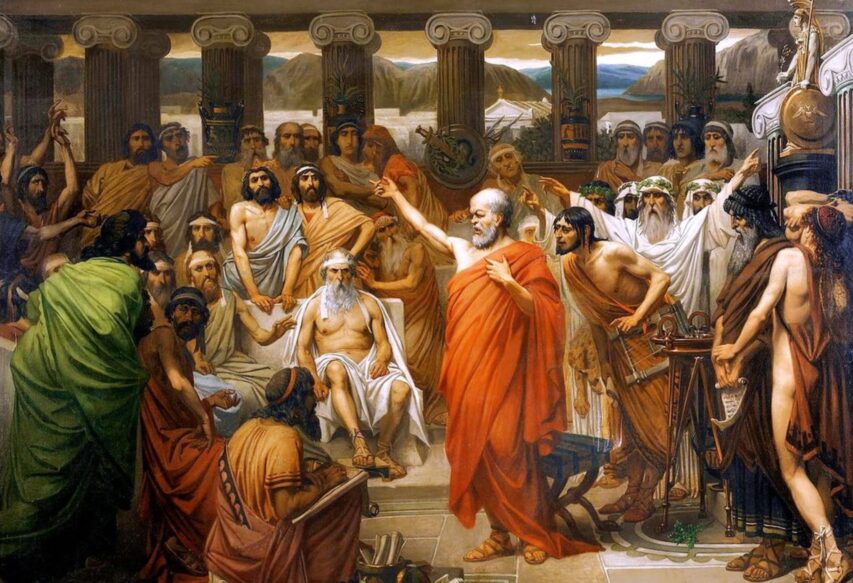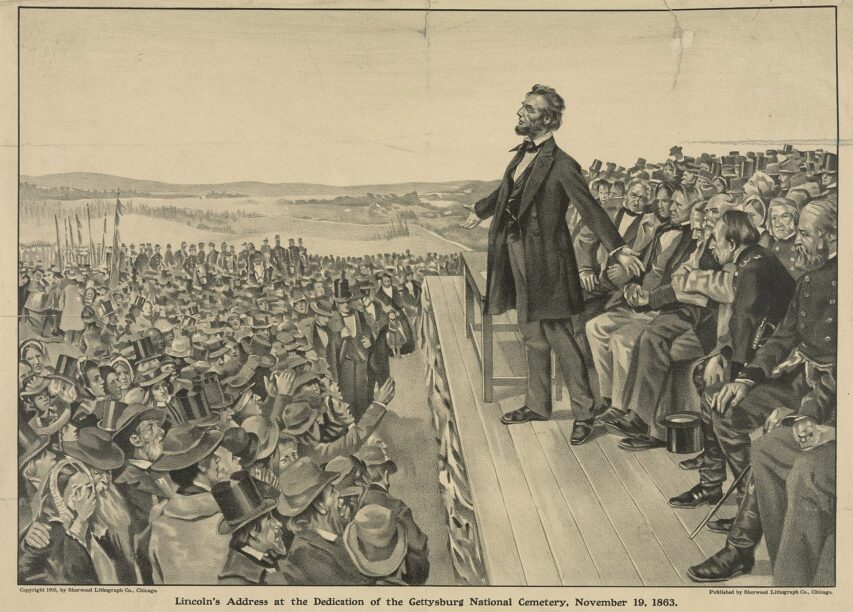BBC Archive
Published Jul 15, 2024“All the tension, the excitement, and indeed the technical demands of driving a modern tank into battle … but, in fact, I haven’t moved a yard.”
Raymond Baxter test drives the British Army’s Chieftain tank simulator, used for training tank drivers. The illusion is created using a large 1:300 scale model of the battlefield, a computer, and a roving mirror connected to a television camera. The battlefield can be altered simply by swapping out the model trees and buildings.
Mr Baxter can attest to how realistic the experience is, and it costs just one tenth of the price of training in a real Chieftain tank.
Clip taken from Tomorrow’s World, originally broadcast on BBC One, 28 September, 1966.
November 21, 2024
1966: Chieftain Tank Simulator | Tomorrow’s World | Retro Tech | BBC Archive
November 20, 2024
Disturbing facts about missing indigenous women in Canada
Karli Lewis at Woke Watch Canada:

Exhibition poster of Nina Vatolina’s Fascism – The Most Evil Enemy of Women. Everyone to the Struggle Against Fascism!, 1941. Vatolina’s poster was published five weeks after the Nazi invasion of the Soviet Union, and was used as socialist propaganda.
Some facts to keep in mind upon the invasion of red dresses and alphabetical hashtags sweeping your newsfeed:
- Indigenous women make up 10% of the women currently missing in Canada. That means that 90% of women missing are non-indigenous. And we can’t even know for sure if they are biological women or men identifying as women as current missing persons data accounts for “gender identity” rather than sex. So who knows how many of that 10% of “missing and murdered women” are actually men.
Recent motions within Canadian parliament have been made to call the 10% a “national genocide”. How can we call 10% a genocide without acknowledging the other 90% as being an even larger genocide? I’d be interested in hearing these activist politicians’ response. It is a pity no side of the House dare pose such questions.
- StatsCan tell us that 22% of the adults missing right now are “non-white”. That would mean that 78% of the adults currently missing in Canada are white. Yet it’s difficult to find data specifying race, when it comes to non-indigenous populations. Instead, you go to look up “missing women by race” and find numerous headlines about “missing white woman syndrome.” You know why it might seem like there is something as absurd as “missing white woman syndrome”? Because the majority of women missing are white.
- The majority of missing people (57%) are identified as males (even though, again, we can’t even know for sure if they are biological males or females identifying as males)
- Similiar to caucasian women, the majority of indigenous women are murdered by a family member or spouse. I feel like too many people carry this false notion that indigenous women are in danger of going missing or getting murdered by someone who isn’t indigenous. I get it; it’s the way this coercive narrative has been framed. But can we please stop acting like we’re suddenly scared of every white guy that happens to drive by on the Rez? The number of these men who’ve turned out to be simple Amazon delivery drivers is getting ridiculous.
- When taking key socioeconomic factors into consideration, like homelessness, history of child abuse, sexual assault, mental health, drug use and trust in neighbours, indigenous people were NOT at a higher risk of victimization than other populations.
- A study from BC found that more than 75% of missing indigenous women were working as prostitutes at the time of disappearance.
On one hand, it’s good that people are being made aware of the dangers of trafficking, and would like to prevent any uptick in this troubling trend.
On the other hand, we should just want ALL women, no matter their race, to be safe. If you’re a decent person who isn’t a full blown racist, you should probably at least try to refrain from using terms like “missing white woman syndrome” whenever you see a woman missing on the news.
The Korean War Week 22 – Winter is Coming! – November 19, 1950
The Korean War by Indy Neidell
Published 19 Nov 2024Eighth Army commander Walton Walker makes his final preparations for the big push north to the Yalu River. The Communist Chinese prepare their own forces and wait for the Americans to make their move. At the same time, the freezing Korean winter arrives in force, plunging temperatures well below freezing. The Americans must get this done, and soon.
(more…)
Trump’s electoral victory may help get rid of “lawfare” as a political tactic
Chris Bray thinks that one of the best things to come out of the last US federal election was that it may have totally discredited the notion of using the courts as a weapon to damage a political opponent:
A hundred years from now, Americans will benefit from a lesson learned in this election: When a political party prosecutes the leading figure of the opposing party in an attempt to influence an upcoming election, voters revolt against the politicization of criminal justice. Prosecuting the other side as a political maneuver makes a martyr — who probably wins the next election, the retribution election.
Shorter version: Donald Trump just buried lawfare. Maybe forever, certainly for a long time. And political lawfare, this profoundly authoritarian misuse of police and prosecutorial power, needed to be killed and buried. Conservative-ish media interprets the moment narrowly:
So lawfare against Trump, by Democrats, is over. I don’t think that’s the point. I think the point is that lawfare is discredited, full stop. Ninety years from now, when the Taylor Swift Party thinks about prosecuting the presumptive presidential nominee of the Drake Party, they’ll be all like, wait, didn’t that like not work and stuff? Donald Trump didn’t kill Democratic lawfare against Donald Trump; Donald Trump killed lawfare. Win elections with political arguments, the end.
Now, NBC News has published a story today that would win all the prizes for tone-deafness and missing the point, if we had journalism awards for that. I’m hinting about a new kind of journalism award, by the way, if anyone wants to design the trophies.
Oh no, Trump might “prosecute adversaries”.
What on earth is a Buck Board Bench?
Rex Krueger
Published Jul 25, 2024Furniture Forensics returns thanks to the mysterious Buck Board bench.
(more…)
QotD: The Chads, the Staceys, and the Incels
I have spent some time in the twilight reaches of the manosphere researching a new book, a world of depressing forums, full of hatred and despair, where young men gather to focus on the absence of sex in their lives. There are two broad categories: The Incels hate women because they won’t sleep with them. The Men Go Their Own Way (MGTOW) guys won’t sleep with women because they hate them.
These boys have their own vocabulary and belief systems. Pretty girls (Staceys) all sleep with the same few Alpha men (Chads). The Staceys ride the Cock Carousel, ie, have sex with the same few Chads. All this sluttish behaviour gives the Staceys something called A Thousand Cock Stare.
It is a grim world, in which women are evil and manipulative, and hated both for being sluts and for being virgins. It is a world in which pictures of pretty girls with their pet dogs are unbelievably sinister. These boys choose to live in this bleak world. They are culpable. But, if you tell all young, white boys that they are damned, why should they not behave as if they are damned?
A society which does not allow for people to atone, to be redeemed, and to be judged on their intent and actions is a miserable place. Most people interact with each other without antagonism most of the time. We should start being a bit more forgiving to each other, ditch the Puritanism and learn to cherish the well-meaning stumble towards decency. Even if, sometimes, we fall.
Antonia Senior, “Identity politics is Christianity without the redemption”, UnHerd, 2020-01-20.
November 19, 2024
The state and society
Lorenzo Warby explains why Karl Marx was wrong about the origins of what he called “the three great inventions” and therefore also mistaken about the societal impact of those inventions:
Gunpowder, the compass, and the printing press were the 3 great inventions which ushered in bourgeois society. Gunpowder blew up the knightly class, the compass discovered the world market and founded the colonies, and the printing press was the instrument of Protestantism and the regeneration of science in general; the most powerful lever for creating the intellectual prerequisites.
Karl Marx, “Division of Labour and Mechanical Workshop. Tool and Machinery” in Economic Manuscripts of 1861-63, Part 3) Relative Surplus Value.
With this quote we can see what is wrong both with Marx’s notion of the role of technology in social causation and with a very common notion of the relationship between state and society.
The false — but very common — view of the relationship of state and society is that the state is a product of its society, that the state emanates from its society. This gets the dominant relationship almost entirely the wrong way around. It is far more true to say that the state is a fundamental structuring element of the social dynamics of the territory it rules rather than the reverse.
It is perhaps easiest to see this by noting the glaring flaw in Marx’s reasoning. The gunpowder, the compass and the printing press were all originally Chinese inventions. Indeed, Europe acquired — via intermediaries — gunpowder and the compass from China. (Gutenberg’s printing press appears to have been an independent invention.)
Source: Nova Reperta Frontispiece, 1588.
Yet, as Marx was very well aware, China did not develop a bourgeoisie in his sense. Indeed, Marx’s notion of the Asiatic mode of production grappled with precisely that lack.1
In 1620, Sir Francis Bacon wrote in his Instauratio magna that
… printing, gunpowder, and the nautical compass … have altered the face and state of the world: first, in literary matters; second, in warfare; third, in navigation …
This was true of the effect of these inventions in European, but not Chinese, hands.
Why were these inventions globally transformative in European, but not Chinese hands? Because of the differences in the structure of European state(s) compared to the Chinese state.
Unified China …
The first difference is that the European states were states, plural. Europe had competitive jurisdictions, it had centuries of often intense inter-state conflict. From the Sui (re)unification (581) onwards China was, with brief interruptions, a single polity.2 What the evidence — both Chinese and Roman — shows quite clearly is that civilisational unity in a single polity is bad for institutional, technological and intellectual development.
The second difference is with the internal structure of European states compared to the Chinese state. The Sui dynasty, by introducing the Keju, the imperial examination — refining the use of appointment by exam that went back to the Warring States period — created a structure that directed Chinese human capital to the service of the Emperor.
There were three tiers of examinations (local, provincial, palace). You could sit for them as often as you wished. So a significant proportion of Chinese males devoted decades of their lives to attempting to pass the exams. Over time, the exams became more narrowly Confucian — probably because it required a high level of detailed mastery, so had more of a sorting effect — thereby promoting intellectual conformism.
[…]
… and divided Europe
Conversely, when gunpowder, the compass and the printing press came to Europe, European states already had a military aristocracy; self-governing cities; an armed mercantile elite; organised religious structures; so a rich array of cooperative institutions. Moreover, kin-groups had been suppressed across manorial Europe, forcing — or giving the social space for — alternative mechanisms for social cooperation to evolve.3, 4 In particular, due [to] its self-governing cities with armed militias, medieval Europe had an (effectively) armed mercantile elite before gunpowder, the compass or printing reached Europe.
Alfonso IX of Leon and Galicia (r.1188-1230) first summoned the Cortes of Leon in 1188. This became the start of the first institutionalised use of merchant representatives in deliberative assemblies. Emperor Frederick Barbarossa (r.1155-1190) had tried something similar earlier, but the mercantile elites of North Italy preferred de facto independence, defeating him at the Battle of Legnano in 1176.
The first European reference to the compass is in a text written some time between 1187 and 1202, with its use appearing to expand over the 1200s. The first reference to gunpowder in Europe is not until 1267 and it took centuries before gunpowder played a major role in European warfare.
Both the compass and gunpowder really only have transformative effects from the late C15th onwards, which is also when the printing press is spreading across Latin Europe. By that time, medieval Europe has already become a machine culture and it had been for centuries the civilisation with the most powerful mercantile elite. A reality driven by competitive jurisdictions, a rural-based military aristocracy, law that was not based on revelation (so it could entrench social bargains), suppression of kin-groups, and self-governing cities.
Competition between European states was a powerful driver of the transformative use of technologies. But so was the level of striving within such states: adventurers able to mobilise resources — and seeking wealth, power, prestige — had far more room to operate (and receive official sanction) in Europe than in China.
In other words, the differences in the development and use of technology — and in social dynamics and formations — between China and medieval Europe was fundamentally driven by the differences in state structures, in how the relevant polities worked.
1. Marx was not an honest intellectual reasoner:
As to the Delhi affair, it seems to me that the English ought to begin their retreat as soon as the rainy season has set in in real earnest. Being obliged for the present to hold the fort for you as the Tribune’s military correspondent I have taken it upon myself to put this forward. NB, on the supposition that the reports to date have been true. It’s possible that I shall make an ass of myself. But in that case one can always get out of it with a little dialectic. I have, of course, so worded my proposition as to be right either way.
Marx to Engels, [London,] 15 August 1857, (emphasis in the original).2. The Song (960-1279) failed to fully unify China, but they were the only significant Han polity. That the Song were effectively within a mini-state system does seem to have affected their policies, including the unusually — for a Chinese imperial dynasty — strong focus on trade and technological development.
3. Kin-groups had already been suppressed in the city-states of the Classical world, including Rome. They re-emerged with the incoming Germanic peoples, and then were suppressed again by the Church and the manorial elite, remaining in the agro-pastoralist Celtic fringe and Balkan uplands.
4. Economists Avner Greif and Guido Tabellini define clan (i.e. kin-group) as “a kin-based organization consisting of patrilineal households that trace their origin to a (self-proclaimed) common male ancestor“. They contrast this with a corporation: “a voluntary association between unrelated individuals established to pursue common interests“. They note they perform similar functions: “they sustained cooperation among members, regulated interactions with non-members, provided local public or club goods, and coordinated interactions with the market and with the state“. Triads, tongs and cults can also perform these functions.
“Sometimes, a bouncy castle is just a bouncy castle”
From Donna Laframboise at Thank You, Truckers!, part of the story of the bouncy castles during the Freedom Convoy protests in Ottawa in 2022:
More than two years after the trucker protest ended, Bianca says the COVID era was clarifying. “It opened my mind to what we need to do — and what we don’t need to do.” In her view, childhoods are precious and fleeting. Society should have gone to greater lengths, she feels, to insulate children from pandemic panic and fear. “The kids don’t need that. They just need to be kids.”
[…]
Other than a brief conversation with TVA — a Quebec French-language television station — Bianca says no one from the media spoke to her.
How do we explain this profound lack of curiosity? A young mother inflated bouncy castles that were wholly impossible to miss. Mere steps from the National Press Building. Two weekends in a row. (Smaller inflatables sometimes put in an appearance mid-week.)
Several journalists commented on the bouncy castles. But no one reported Bianca’s story. No one tried to understand.
[…]
Many people instantly grasped the outsized, symbolic significance of the inflatables. “I will never get tired of seeing videos with the bouncy castles in them,” one person tweeted. “It just crumbles the false narrative …”
But “the mainstream media told us the trucker rally was all hate and violence,” someone else pointed out facetiously, while another chimed in: “Those fringe extremists ruining Canada with their happiness and joy.”
If the flag of Canada is ever changed, still another added, the maple leaf should be replaced with a red bouncy castle.
“I absolutely love the tactic” (italics here and below by me), someone else tweeted. “It’s peaceful, family oriented, and gives the Politicians the finger at the same time. Mayor Watson was near tears on CTV today.”
Many people — both sympathetic and hostile to the protest — talked about the bouncy castles as if they were part of a pre-determined plan, dreamt up by a mastermind. According to one individual, the “bouncy castle is probably one of the greatest strategic moves against any government lusting for violence in the history of war strategies“.
Another described the inflatables as “one of the finest information warfare tactics I’ve seen to date”. In the opinion of someone else, “The bouncy castles are the unsung heroes of the protest. The government doesn’t dare send in the tanks or snipers while children are playing in bouncy castles. The optics would be horrific.”
Thomas Juneau, a University of Ottawa professor who specializes in Middle Eastern politics, confidently told the world: “Just to be clear, the bouncy castle was an info op, and more than a few gullible commentators fell for it”. In the universe inhabited by our pompous professor, no evidence is actually required. According to someone else, the presence of bouncy castles pointed to “a sophistication of terrorists”.
On the Monday following the first bouncy castle weekend, someone said the inflatables had disappeared because the “bouncy castle guy” had to report to work. Ten days later, someone else claimed the bouncy castle (singular) had exited the stage because those responsible “are hoping to get their deposit back on it so they can afford the bus fare back to Alberta”.
But the facts in this matter are straightforward. The Freedom Convoy story is about ordinary people who did extraordinary things. Bianca of the Bouncy Castles was one of those people. A mom who cared about the kids. A resident of Quebec who lived three hours distant. An event planner who knows how to make things happen.
There’s nothing covert or complicated here. Sometimes, a bouncy castle is just a bouncy castle.
WF-51: A Swiss Intermediate-Cartridge Copy of the FG-42
Forgotten Weapons
Published Aug 5, 2024After World War Two the Swiss needed a new self-loading military rifle to replace their K-31 bolt actions. Two major design tracks followed; one being a roller-delayed system based on the G3 at SIG and the other being a derivative of the German FG-42 at Waffenfabrik Bern. Bern, under the direction of Adolph Furrer, had been experimenting with intermediate cartridges since the 1920s, and they used this as a basis to develop an improved FG-42 using an intermediate cartridge (7.5x38mm). The program began in 1951 and went through about a half dozen major iterations until it ultimately lost to the SIG program (which produced the Stgw-57).
Today we are looking at one of the first steps in the Bern program, the WF-51. The most substantial change form the FG42 design here is the use of a tilting bolt instead of a rotating bolt like the Germans used. It is a beautifully manufactured firearm, and a real pleasure to take a look at …
Many thanks to the Royal Armouries for allowing me to film and disassemble this rifle! The NFC collection there — perhaps the best military small arms collection in Western Europe — is available by appointment to researchers:
https://royalarmouries.org/research/n…You can browse the various Armouries collections online here:
https://royalarmouries.org/collection/
(more…)
QotD: The Reformation
The Reformation’s great complaint against the late-medieval Church is that it, the Church, had turned Catholicism entirely into a process. Those naive folks who argue that life wasn’t so hard for the medieval peasant because he had all those days off — 180 some odd saints’ days, feast days, and so on — have a bit of a point for all that. Ritual life simply was community life; “free time” as we understand it just wasn’t a thing in the middle ages, and not just because life was such a constant struggle. Every hour of your day carried its obligation to someone; there’s a reason the very best sources for “daily life in the middle ages” are called books of hours.
Your hotter Protestants, your John Calvins and Oliver Cromwells and so on, saw all of this as mere ritual. And to be fair to them, late-medieval Catholicism was very elaborate, and very, very weird — slog through a few chapters of The Stripping of the Altars if you want the details. To the Prods, this was cheating — you can’t just go through the motions and expect to get into Heaven. They made a similar distinction between “natural magic” and the unlawful stuff — the one was undertaken only after deep study and the most rigorous self-purification, while the other “worked” entirely mechanically, because what the sorcerer was really doing was cheating; he was really making a deal with a (or The) devil, to short-circuit the natural processes.
Now, it’s important to realize that the Protestants were not saying anything close to “do your own thing, man”. They were NOT hippies, encouraging everyone to read the Bible and decide for themselves how best to commune with the Big JC. The German peasants thought that’s what Martin Luther was saying back in 1524, but Luther himself was out there urging the authorities to smash the peasants with extreme prejudice. The Protestants were, in fact, extremely concerned about ritual. It just had to be the right ritual, the Biblically sanctioned ritual, and nothing but that — that’s what “Puritanism” (originally an insult) means.
Severian, “Faith vs. Works”, Rotten Chestnuts, 2021-09-07.
November 18, 2024
“The Great Canadian Lie is the claim that we’ve ‘always been multicultural'”
Fortissax thinks that the rest of Canada has lessons to be learned from Quebec:
If you are a Canadian born at any point in the Post-WWII era, you have been subjected to varying degrees of liberal “Cultural Mosaic” propaganda. This narrative exploits the historic presence of three British Isles ethnic groups (which had already been intermixing for millennia) and the predominantly Norman French settlers to justify the unprecedented mass migration of people from the Third World into Canada. This process only began in earnest in the 1990s before accelerating rapidly in the 2010s.
The Great Canadian Lie is the claim that we’ve “always been multicultural”, as though the extremely small and inconsequential presence of “Black Loyalists” or the historically hostile Indigenous groups (making up only 1% of the population at Canada’s founding in 1867) played any serious role in shaping the Canadian nation, its identity, institutions, or culture. Inspired by Dr. Ricardo Duchesne’s book Canada in Decay: Mass Immigration, Diversity, and the Ethnocide of Euro-Canadians (2017), which chronicled the emergence of two ethnic groups uniquely born of the New World, I delved into the 2021 Census data collected by the Canadian government to explore the ethnic breakdown of White Canadians in greater detail
The evidence is clear. In 2021, just four years ago, 72.7% of the entire Canadian population was not just White, but Anglo-Canadian and French-Canadian, representing an overwhelming presence compared to visible minorities and other White ethnic groups, such as the small populations of Germans and Ukrainians.
In the space last night, I highlighted this historical fact and explained to the audience the ethnogenesis of the Anglo-Canadian and its significance. While we all recognize that the Québécois are a homogeneous group descended predominantly from Norman French settlers — such as the Filles du Roi and Samuel de Champlain’s 1608 expedition, which established Quebec City with a single-minded purpose — the Anglo-Canadian story also deserves similar recognition for its role in shaping Canada’s identity.
But what is less known is that Anglo-Canadians are just as ethnically homogeneous as the Québécois, from Nova Scotia to British Columbia. Anglo-Canadian identity emerged from Loyalist Americans in the 1750s, beginning with the New England Planters in Nova Scotia — “continentals” with a culture distinct from both England and the emergent Americans. After the American Revolutionary War, they marched north with indomitable purpose, like Aeneas and the Trojans, to rebuild their Dominion. Author Carl Berger, in his influential work The Sense of Power: Studies in the Ideas of Canadian Imperialism, demonstrates that the descendants of Loyalists were the one ethnic group that nurtured “an indigenous British Canadian feeling.” The following passage from Berger’s work is worth citing:
The centennial arrival of the loyalists in Ontario coincided with the fiftieth anniversary of the incorporation of the City of Toronto and, during a week filled with various exhibitions, July 3 was set aside as “Loyalist Day”. On the morning of that day the platform erected at the Horticultural Pavilion was crowded with civic and ecclesiastical dignitaries and on one wall hung the old flag presented in 1813 to the York Militia by the ladies of the county. Between stirring orations on the significance of the loyalist legacy, injunctions to remain faithful to their principles, and tirades against the ancient foe, patriotic anthems were sung and nationalist poetry recited. “Rule Britannia” and “If England to Herself Be True” were rendered “in splendid style” and evoked “great enthusiasm”. “A Loyalist Song”, “Loyalist Days”, and “The Maple Leaf Forever”, were all beautifully sung
The 60,000 Loyalist Americans, who arrived in two significant waves, were soon bolstered by mass settlement from the British Isles. However, British settlers assimilated into the Loyalist American culture rather than imposing a British identity on the new Canadians. The first major wave of British settlers after the Loyalists primarily consisted of the Irish. Before Confederation in 1867, approximately 850,000 Irish immigrants settled in Canada. Between 1790 and 1815, an estimated 6,000 to 10,000 settlers, mainly from the Scottish Highlands and Ireland, also made their way to Canada.
Another large-scale migration occurred between 1815 and 1867, bringing approximately 1 million settlers from Britain to Canada, specifically to Ontario, Nova Scotia, and New Brunswick. New Brunswick was carved out from the larger province of Nova Scotia to make room for the influx of Loyalists. During this time, settlers from England, Scotland, and Ireland intermingled and assimilated into the growing Anglo-Canadian culture. Scottish immigrants, who constituted 10–15% of this wave, primarily spoke Gaelic upon arrival but adopted English as they integrated.
All settlers from the British Isles spoke English (small numbers spoke Gaelic in case of Scots), were ethnically and culturally similar, and had much more in common with each other than with their continental European counterparts.
Settlement would slow down in the years immediately preceding Confederation in 1867 but surged again during the period between 1896 and 1914, with an estimated 1.25 million settlers yet again from Britain moving to Canada as part of internal migration within the British Empire. These settlers predominantly also [went] to Ontario and the Maritimes, further forging the Anglo-Canadian identity.
A common misconception among Canadians is that Canada “was a colony” of Britain, subordinate to, or a “vassal state”. This is wrong. Canadians were the British, in North America. There were no restrictions on what Canadians could or could not do in their own Dominion. From the first wave of Loyalists onward, Canadians were regularly involved in politics and governance, actively participating in shaping the nation.
Like the ethnogenesis of the English, which saw Angles, Saxons, Jutes, and Frisians converge into a new people and ethnicity (the Anglo-Saxons), Anglo-Canadians are a combination of 1.9 million English, 850,000 Irish (from both Northern and Southern Ireland), and 200,000 Scots, converging with 60,000 Loyalist Americans from the 13 Colonies. These distinct yet similar ethnic groups no longer exist as separate peoples in Canada. Anglo-Canadians are the fusion of the entire British Isles. The Arms of Canada, the favourite symbol of Canadian nationalists today, represents this new ethnic group with the inclusion of the French:
It’s no coincidence that, once rediscovered, the Arms of Canada exploded in popularity as the emblem of Canadian nationalists. Unlike more controversial symbols that appeal to pan-White racial unity, such as the Sonnenrad or Celtic cross, the Arms of Canada resonate as a distinctly Canadian icon, deeply rooted in the nation’s true heritage and history — a heritage that cannot be bought, sold, or traded away. This is an immutable bloodline stretching into the ancient past. If culture is downstream from race, and deeper still, ethnicity, then Canadian culture, values, and identity are fundamentally tied not just its race, but its ethnic composition. The ethnos defines the ethos. Canadians are not as receptive to the abstract idea of White nationalism for the same reason Europeans aren’t — because they possess a cohesive ethnic identity, unlike most White Americans.
Changing the way “our leaders” speak to us
Ted Gioia says that the old rules of communicating to the public are undergoing a major shift.
Before they executed Socrates in the year 399 BC — on charges of impiety and corrupting youth — the philosopher was given a chance to defend himself before a jury.
Socrates started his defense with an unusual plea.
He told his listeners that he had no skill at making speeches. He just knew the everyday language of the common people.
Socrates explained that he had never studied rhetoric or oratory. He feared that he would embarrass himself by speaking so plainly in his trial defense.
“I show myself to be not in the least a clever speaker,” Socrates told the jurors, “unless indeed they call him a clever speaker who speaks the truth.”
He knew that others in his situation would give “speeches finely tricked out with words and phrases”. But Socrates only knew how to use “the same words with which I have been accustomed to speak” in the marketplace of Athens.
Socrates wasn’t exaggerating. His entire reputation was built on conversation. He never wrote a book — or anything else, as far as we can tell.
Spontaneous talking was the basis of his famous “Socratic method” — a simple back-and-forth dialogue. You might say it was the podcasting of its day. He aimed to speak plainly — seeking the truth through open and unfiltered conversation.
That might get you elected President in the year 2024. But it didn’t work very well in Athens, circa 400 BC.
Socrates received the death penalty — and was executed by poisoning.
Is that shocking? Not really.
Western culture was built on one-way communication. Leaders and experts speak — and the rest of us listen.
Socrates was the last major thinker to rely solely on conversation. After his death, his successors wrote books and gave lectures.
That’s what powerful people do. They make decisions. They give orders. They deliver speeches.
But not anymore.
In the aftermath of the election, the new wisdom is that giving speeches from a teleprompter doesn’t work in today’s culture. Citizens want their leaders to sit down and talk.
And not just in politics. You may have seen the same thing in your workplace — or in classrooms and other group settings. People now resist one-way orders from the top.
The word “scripted” is now an insult. Plainspoken dialogue is considered more trustworthy. This is part of the up-versus-down revolution I’ve written about elsewhere — a conflict that, I believe, may have even more impact on society than Left-versus-Right.
For better or worse, the hierarchies we’ve inherited from the past are toppling. To some extent, they are even reversing.
This is now impacting how leaders are expected to speak. Events of the last few days have raised awareness of this to a new level — but the “experts” should have expected it. That’s especially true because the experts will be those most impacted by this shift.
HBO’s Rome Ep. 3 “The owl in a thorn bush” – History and Story
Adrian Goldsworthy. Historian and Novelist
Published Jul 17, 2024Episode Three: Now that Caesar has crossed the Rubicon, the Civil War has begun and the series gathers pace.
Vidcaps taken from the dvd collection and copyright belongs to the respective makers and channels.
Transcript
QotD: Napoleon and his army
To me the central paradox of Napoleon’s character is that on the one hand he was happy to fling astonishing numbers of lives away for ultimately extremely stupid reasons, but on the other hand he was clearly so dedicated to and so concerned with the welfare of every single individual that he commanded. In my experience both of leading and of being led, actually giving a damn about the people under you is by far the most powerful single way of winning their loyalty, in part because it’s so hard to fake. Roberts repeatedly shows us Napoleon giving practically every bit of his life-force to ensure good treatment for his soldiers, and they reward him with absolutely fanatical devotion, and then … he throws them into the teeth of grapeshot. It’s wild.
Napoleon’s easy rapport with his troops also gives us some glimpses of his freakish memory. On multiple occasions he chats with a soldier for an hour, or camps with them the eve before a battle; and then ten years later he bumps into the same guy and has total recall of their entire conversation and all of the guy’s biographical details. The troops obviously went nuts for this kind of stuff. It all sort of reminds me of a much older French tradition, where in the early Middle Ages a feudal lord would (1) symbolically help his peasants bring in the harvest and (2) literally wrestle with his peasants at village festivals. Back to your point about the culture, my anti-egalitarian view is that that kind of intimacy across a huge gulf of social status is easiest when the lines of demarcation between the classes are bright, clear, and relatively immovable. What’s crazy about Napoleon, then, is that despite him being the epitome of the arriviste he has none of the snobbishness of the nouveaux-riches, but all of the easy familiarity of the natural aristocrat.
True dedication to the welfare of those under your command,1 and back-slapping jocularity with the troops, are two of the attributes of a wildly popular leader. The third2 is actually leading from the front, and this was the one that blew my mind. Even after he became emperor, Napoleon put himself on the front line so many times he was practically asking for a lucky cannonball to end his career. You’d think after the fourth or fifth time a horse was shot out from under him, or the guy standing right next to him was obliterated by canister shot, the freaking emperor would be a little more careful, but no. And it wasn’t just him — the vast majority of Napoleon’s marshals and other top lieutenants followed his example and met violent deaths.
This is one of the most lacking qualities in leaders today — it’s so bad that we don’t even realize what we’re missing. Obviously modern generals rarely put themselves in the line of fire or accept the same environmental hardships as their troops. But it isn’t just the military, how many corporate executives do you hear about staying late and suffering alongside their teams when crunch time hits? It does still happen, but it’s rare, and the most damning thing is that it’s usually because of some eccentricity in that particular individual. There’s no systemic impetus to commanders or managers sharing the suffering of their men, it just isn’t part of our model of what leadership is anymore. And yet we thirst for it.
Jane and John Psmith, “JOINT REVIEW: Napoleon the Great, by Andrew Roberts”, Mr. and Mrs. Psmith’s Bookshelf, 2023-01-21.
1. When not flinging them into the face of Prussian siege guns.
2. Okay, there are more than three. Some others include: deploying a cult of personality, bestowing all kinds of honors and awards on your men when they perform, and delivering them victory after victory. Of course, Napoleon did all of those things too.














